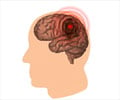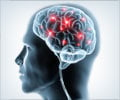
‘7 out of 10 patients with PATJ gene variants suffer severe sequelae three months after having a stroke, in other words, they are in a situation of dependence, compared to less than half of patients who do not present these variants. ’
Tweet it Now
Dr. Jordi Jiménez Conde, coordinator of the study and attending physician at the Hospital del Mar's Neurology Department, explained that "It is the largest study published to date on the genetics and prognosis of stroke, and the first that has found consistent results and been replicated in different countries." They analysed the degree of disability after three months of more than 2,000 patients with ischemic stroke --caused by the blockage of a cerebral artery and which represents 88% of total strokes-- by studying multiple clinical factors and genetic data. Specifically, more than 5 million genetic variants were studied for each individual. "The PATJ gene shows several variants that significantly influence recovery in patients", says Dr. Jiménez Conde. It is a gene involved in cell binding that has a strong presence in nervous tissue and which has already been associated with sleep disorders and obesity.
Genetic influence on recovery
"In this study, we identified a set of genetic variants that are relatively common in the population, and which are associated with worse recovery from stroke after three months", stresses Dr. Marina Mola-Caminal, first author of the study and a researcher in the IMIM's Neurovascular Research Group. This leads the way to studying the mechanisms used by the PATJ gene to influence this process. "In the future, these variants could be used as biomarkers for stroke sufferers, and, depending on the presence of risk alleles (alternative forms of a gene) in each individual, rehabilitation strategies could be personalised."
At the same time "we are able to indicate a region of the genome that is heavily involved in neuroplasticity and neuroregeneration processes, and perhaps if we understand the pathways, we will be able develop new treatments that use this gene as a therapeutic target and help improve patient prognosis", notes Dr. Jiménez Conde.
Advertisement
Source-Eurekalert











